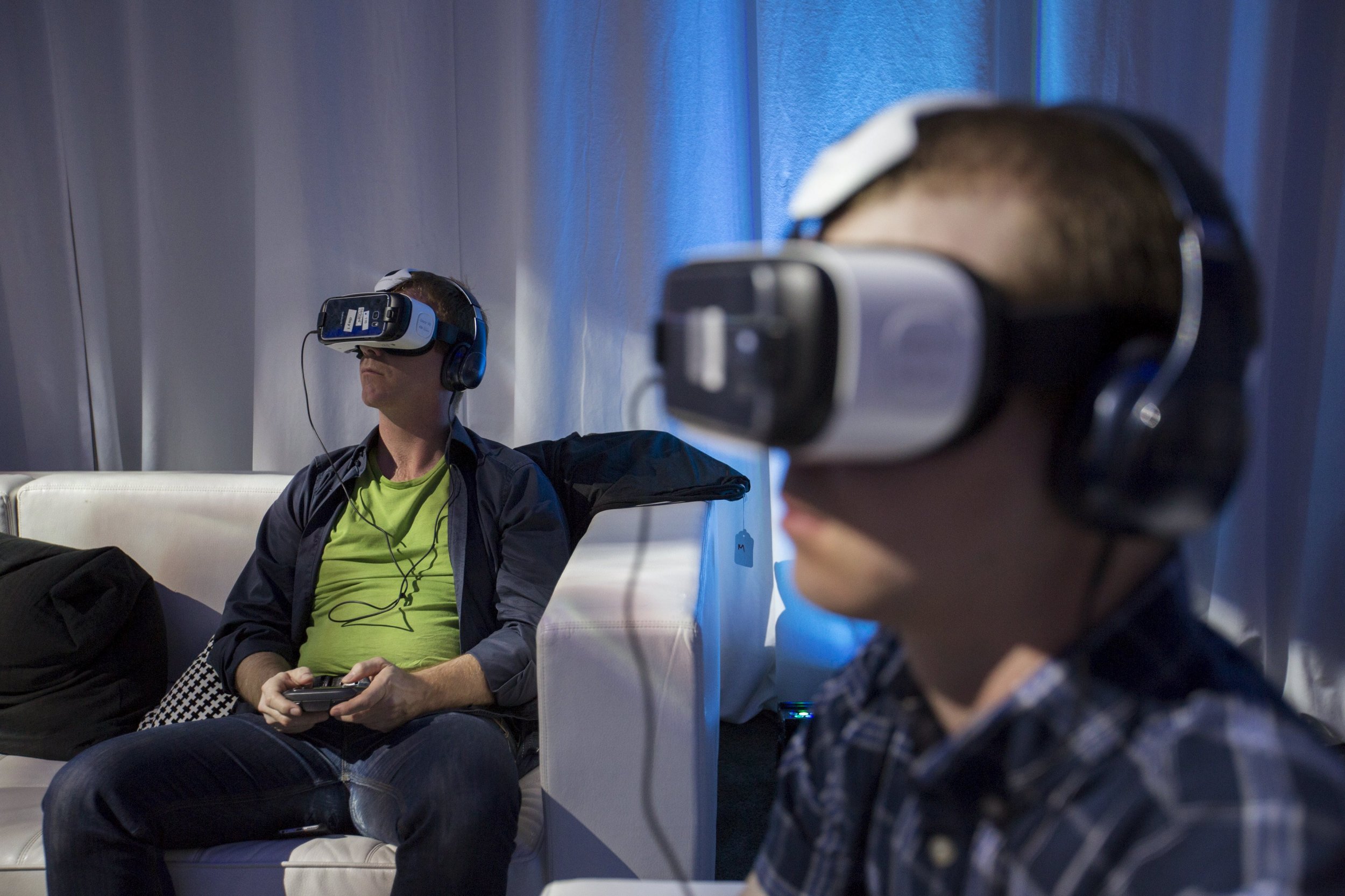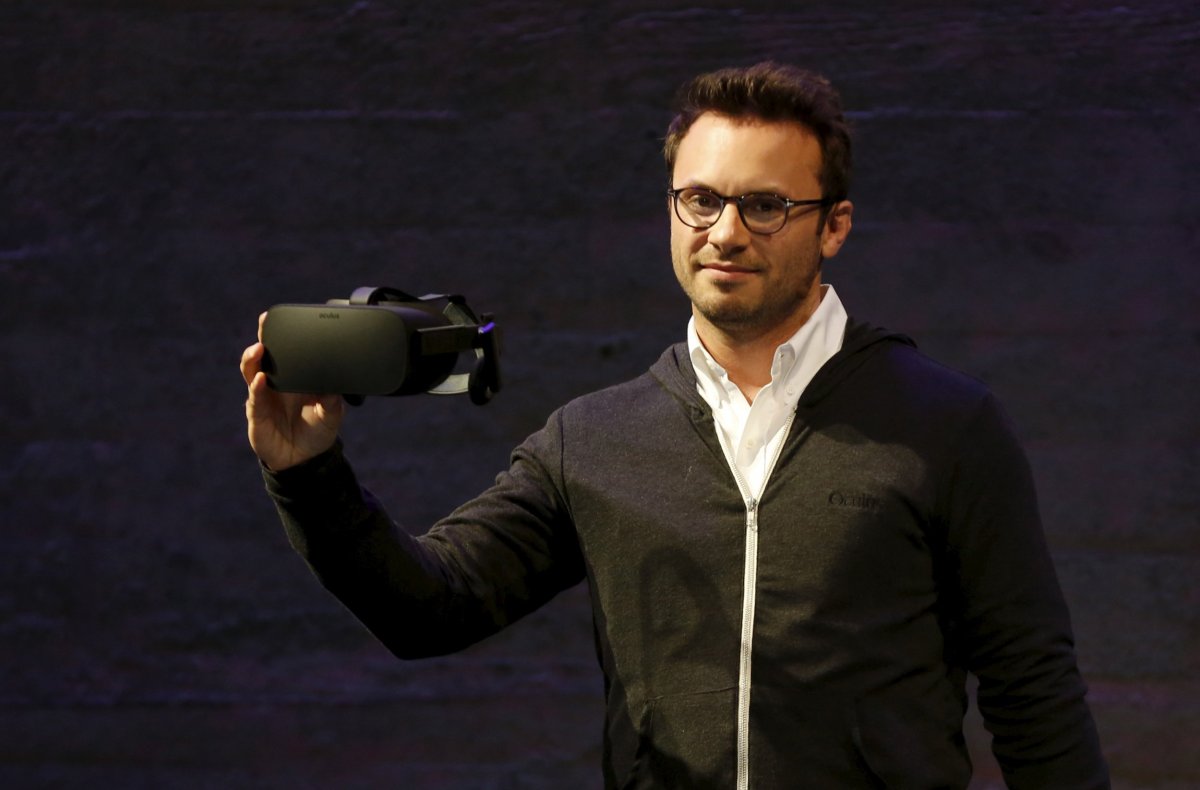
Technology evangelists have been saying virtual reality is just around the corner for more than 20 years. But there are finally real products—and real money—betting that the technology of simulating the real world is finally advanced enough to capture consumers.
A conference in a Hollywood hotel last month may well have been the tipping point at which virtual reality finally crossed over from wizardry to Wal-Mart. Game programmers and developers of other 3-D applications gathered to discuss the future of the Oculus Rift, the much-hyped headset that has gone from Kickstarter project to multibillion-dollar Facebook property in three years.
Such events often tout next-big-thing technologies that die quietly as home consumers ignore them—does anyone remember Nintendo's Virtual Boy, or Intel's Viiv PCs for high-def TV? But a single minute spent with a Rift strapped to one's head is enough to convince the most cynical skeptic. You don't look at a screen; you seem to be immersed in the middle of a wraparound, three-dimensional environment through which you can move.
Is the Rift indistinguishable from the real world? No. Does it make a big-screen TV seem like a relic from the 20th century? Absolutely.
Impressive as the hardware is, what will sell VR is content that exploits its potential.
The killer demo at the conference was Bullet Train, a shoot-'em-up from Epic Games, makers of the hugely popular Unreal and Gears of War. Oculus Rift's crisp visuals and immersive sound don't make you just a player, they turn you into Keanu Reeves in The Matrix, complete with the ability to slow down time, catch flying bullets and throw them back lethally at the computer-generated killers who fired on you. This isn't a couch potato's game; it's a workout. It's exhausting and exhilarating.
You don't sit, and you don't use a joystick. Instead, you play Bullet Train standing up, a Rift on your face and Oculus's prototype Touch controllers in each hand. You look around the station by turning your head or your entire body. You use your hands to reach out and grasp guns, then shoot them by raising your arm to bring the gun's sight in line with your eye before pulling the trigger. It's much more like shooting a real gun, and you need to constantly twist and spin your body to shoot attackers coming from all sides. When you run out of your bullets, you release your grip on the Touch, and the gun drops from your hand so you can pick up a loaded one beside a fallen enemy.
Less innovative games can still provide breathtaking wraparound views, with a soundscape that stays spatially in sync with the view as you move your head to look around. EVE: Valkyrie plants you in the cockpit of an outer space fighter plane maneuvering among a herd of enormous, whale-like starships. It's Battlestar Galactica, only you're in Starbuck's hot seat.
Other game titles range from Pac-Man, which can appear as a full-size arcade screen on a portable headset, to Minecraft, the build-it-yourself world that has sold more than 20 million copies worldwide.
The technology has consumer brands including Netflix and 20th Century Fox thinking beyond games to videos, as well as a growing spread of three-dimensional applications for VR headsets: real-estate tours, remote conference systems, a sculpting studio, training environments for everything from martial arts to centrifuge maintenance. In VR applications, one is immersed and moves around a virtual room or a virtual world, reaching out to touch and grasp realistic objects that are only computer-generated illusion. Some products are available already; others scheduled for sale or download in the next few months.
Oculus, the company whose name is Latin for eye, began when well-known game programmer Palmer Luckey created a new 3-D headset in 2012, and games legend John Carmack—lead programmer of Doom and Quake, and creator of many advances in 3-D animation—adapted software from his employer, Id Software, to run on it. Luckey then teamed up with another successful programmer, Brendan Iribe, to launch a kickstarter campaign to fund a company that would develop and sell the Rift. The campaign quickly raised $1 million, then $2 million. Palmer and Iribe were able to start Oculus and hire Carmack.

Last year, Facebook boosted VR a thousandfold by buying Oculus for over $2 billion, moving the company from the greater Los Angeles area to Facebook's campus in Silicon Valley. It seems Facebook's executives realized Rift's potential to pull people away from everything else, including Facebook.
Oculus's founders don't see the big buyout as their finish line, but as the start of a decades-long, well-funded march to make VR much more realistic. That will require not just incremental improvements in technology but complete breakthroughs. "We need 500 times the video resolution." Iribe tells Newsweek, to make the virtual world look like the real one. "We need a true 3-D capture device with depth, not a camera designed to take flat pictures."
Facebook and Oculus aren't alone at the forefront of consumer VR. At the conference, Samsung debuted a $99 headset called the Gear VR, built with technology licensed from Oculus, that accepts a late-model Samsung smartphone placed sideways in front of the wearers' eyes, turning it into a stereo video display. (You'll need to don earbuds or headphones to complete the wraparound experience.) Sony has a competing model called Playstation VR, which connects to a Playstation. HTC has a PC headset called Vive due next year.
If you don't play games, VR is still a great way to watch two-dimensional TV. Netflix, viewed in a portable pair of battery-powered Gear VR goggles, appears as if you are watching a big-screen TV rather than a laptop browser or a tiny phone screen. The online video service went live for Gear owners during the conference. Hulu, TiVo, 20th Century Fox and Lionsgate are among those who pledged to appear by next year.
For anyone who spends a lot of time on airplanes, it seems an ideal way to pass the hours watching big-screen TV while oblivious to the guy in the next seat. Just as important, the guy in the next seat can't see what you're watching. Instead of awkwardly sitting through a shower scene from Orange Is the New Black on a tiny phone screen, you can comfortably kick back and watch in private, in public, with a big-screen view. (Any discussion of VR's porn potential was deliberately kept out of the event's presentations and interviews, but the stuff is already online.)
Analysts have forecast as many as 12 million VR headset sales next year. But for now, prices will be what keeps VR out of the hands of the masses. A Gear VR, the entry-level headset, still requires a top-end Samsung phone and another hundred bucks. A full Rift setup will require most customers to buy a new PC with powerful enough hardware to run Oculus's equipment. Several PC makers have promised Rift-certified models for under $1,000, but that still brings the total price to $1,500 to $2,000 for a proper setup. Give it a few years, though, and VR will be where smartphones are eight years after the first iPhone: affordable, ubiquitous and no longer questioned as a necessity.
"People say to me that they have no use for VR," a software engineer from Germany told an American in the hallway outside Oculus's keynote presentation. "I always know then that they have not tried it."
Uncommon Knowledge
Newsweek is committed to challenging conventional wisdom and finding connections in the search for common ground.
Newsweek is committed to challenging conventional wisdom and finding connections in the search for common ground.
About the writer
To read how Newsweek uses AI as a newsroom tool, Click here.








